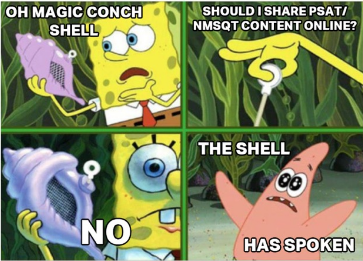College Board cancelling scores over memes is unfair

Photo courtesy of College Board of Education
@CollegeBoard tweeted their own meme saying “The shell has spoken. #PSAT/NMSQT”. It received 183 retweets and 1,213 likes as of Oct 30.
As a two-year PSAT veteran, I find the memes made about the test comforting. It takes away the nerves of waiting almost two months to get scores back. The long and mundane passages are made bearable by the unexplainable memes fellow test-takers made.
I see no problem with the memes that are made. The majority of the students take the test at the exact same time and the memes have no way of actually helping them on the test. The few that take the test on the alternate test day are no better off knowing that dolphins have special whistles or that Wisconsin produces the most cheese. There are cases of actual answers being shared, but those are rare and do not do much good after the test is already finished.
Students who participate in the PSAT sign an agreement stating that they will not share any test information through text, email or social media. Since 2014, it has become a yearly ritual for teens to share inside jokes from the test in meme format. The College Board started fighting back with their own memes and threatened to cancel scores of those who share test information.
When test day came around, @CollegeBoard tweeted two memes warning test-takers not to share PSAT content online.
In order to protect themselves, students have started blocking the College Board on Twitter and posting memes from anonymous accounts. Twitter user @sheskindakaila posted a reminder for students to “block College Board before liking and retweeting #psat memes”. Tweets such as these get anywhere from hundreds to thousands of likes and retweets in a matter of a day.
The sharing of test information is not limited to Twitter; another popular platform for PSAT memes this year was TikTok. Users made videos about parts of the test they struggled with or poked fun at the subject of the passages.

Junior Maegan Morrison is a second-year reporter on The Oriole staff. She enjoys classic art and is a 90’s devotee. She loves the works of artists...


